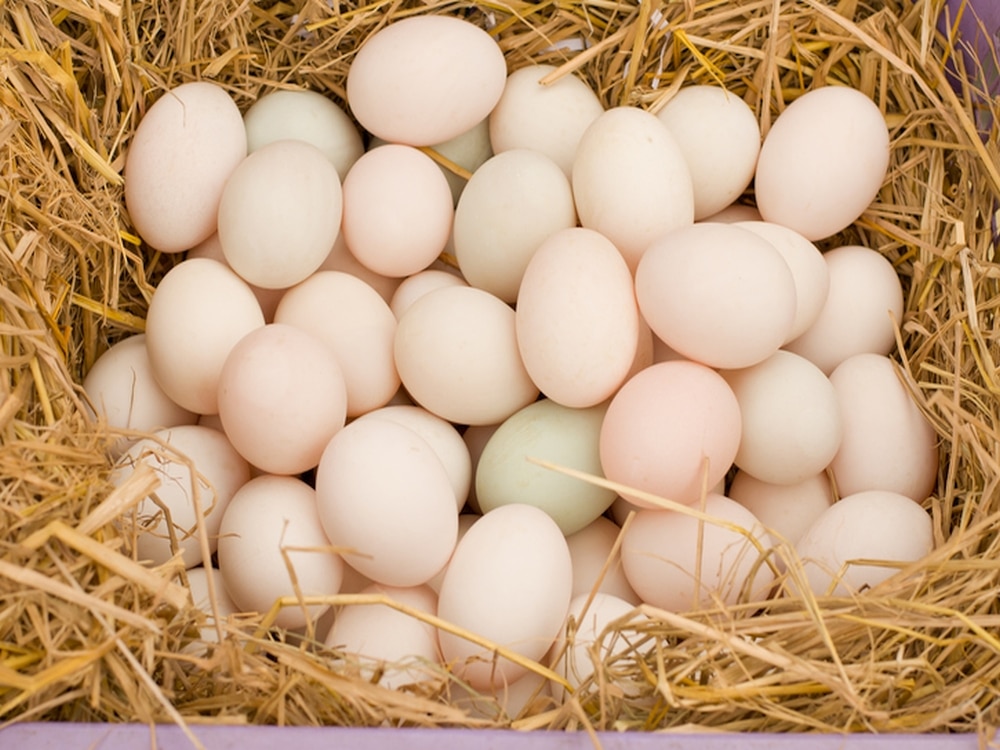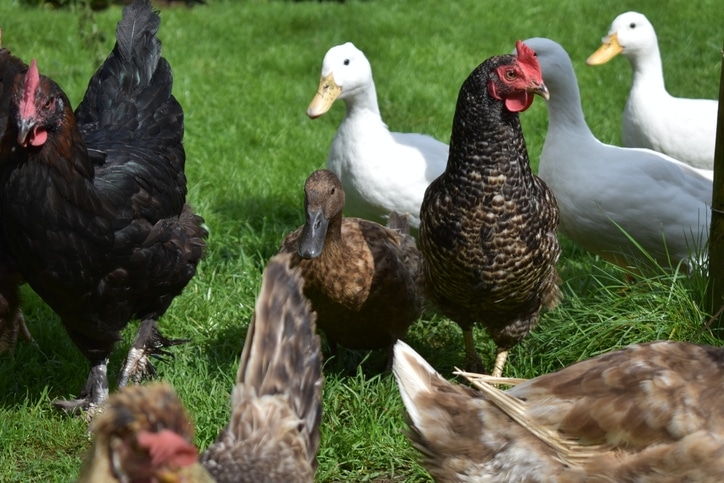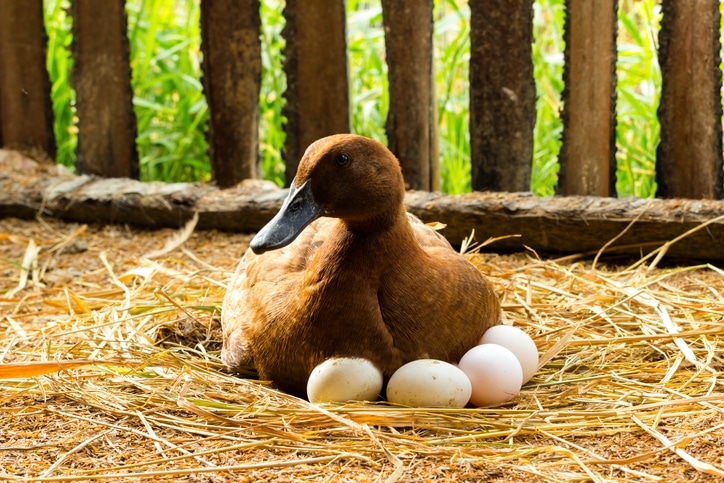When comparing duck eggs vs chicken eggs, they might look really similar. Yet, full-grown ducks and chickens are very different in terms of behavior and appearance.
In general, chickens lay more eggs than ducks since that’s what they’re bred for. Even so, it can be difficult to distinguish the eggs of both animals. So, let’s see what’s different about them to determine which one you should raise.
Comparison: Duck Eggs vs Chicken Eggs

At first glance, chicken eggs and duck eggs seem very similar, but there are lots of ways they can be compared. Here are some aspects of these eggs that differ from each other.
Price
Duck eggs are much more expensive than chicken eggs. In the United States, you can find a dozen chicken eggs for $2, but duck eggs are often between $6 and $12 a dozen. This is mostly because duck eggs are much harder to find.
Thus, duck eggs are rarely cooked with, but if you raise ducks yourself, you’ll likely earn a lot more profit than you would with chickens.
Size
Most duck eggs are slightly larger than chicken eggs. Large chicken eggs are about 2 ounces while most duck eggs are closer to 2.5 ounces. Of course, the exact size will vary based on the bird’s breed.
When cooking, a good rule of thumb is that one duck egg is equal to about one and a half chicken eggs. So, you can use two duck eggs in the place of three chicken eggs.
Color

For both ducks and chickens, the color of the eggs vary based on breed. Chicken eggs usually have a wide range of colors while duck eggs are usually white. However, it’s possible for duck eggs to be gray, green, black, or blue.
Luckily, the color of the eggs don’t usually affect the taste. In fact, some families prefer white eggs so they can use them for dying Easter eggs.
The yolks of chicken eggs vs duck eggs usually look different. Chicken egg yolks are pale or bright yellow while the yolks of duck eggs are closer to gold or orange. Duck egg yolks are much more vibrant in comparison.
Egg Laying
Ducks don’t lay as many eggs as chickens, but they usually lay eggs year-round. They also lay eggs for more years than chickens do. Yet, both birds produce a decent amount of eggs.
Chickens reach their egg production peak at 18 to 24 months old, and then the amount of eggs slowly decreases after that. However, ducks lay lots of eggs for 3 to 4 years before they start slowing down. Like other aspects, these numbers vary for different breeds.
Nutrition
Both types of eggs have great nutrition. Yet, duck eggs are often more nutritious since they’re larger. Here’s a comparison of the nutritional features of duck eggs vs chicken eggs. Keep in mind that duck eggs are larger than chicken eggs.
| Chicken Eggs | Duck Eggs | |
| Calories | 148 | 185 – 223 |
| Protein | 10 – 12 grams | 12 – 13 grams |
| Fat | 10 – 11 grams | 14 – 18 grams |
| Cholesterol | 141% | 276% |
| Sodium | 70mg | 102mg |
| Fiber | 0 grams | 0 grams |
| Choline | 40% | 36% |
| Copper | 7% | 6% |
| Folate | 9% | 14% |
| Iron | 7% | 20% |
It’s important to remember that these numbers are based on general estimates. Eggs from different breeds and farms will have different nutritional values.
Cooking

Duck eggs can be used for all the same dishes as chicken eggs. However, the whites of duck eggs can be harder to whip up because they have a lower water content. Overcooked duck eggs could also become rubbery.
In general, chicken eggs are easier to cook with, but many chefs believe that duck eggs add more flavor to egg dishes like omelettes and soufflés. They’re considered richer and creamier. Cooking with duck eggs might require some experimenting to get it right, but with practice, they can make great alternatives to chicken eggs. Some people even say that chicken eggs taste bland in comparison.
Taste
Duck eggs have a more intense flavor. They’re richer and creamier in recipes, so many people prefer their taste over chicken eggs. Yet, duck eggs are less common and more expensive, which is why chicken eggs are more popular despite the lack of rich flavor.
It’s possible for duck eggs to have a slight fishy smell to them, but it won’t affect the taste. The odor occurs because ducks are more likely to eat slugs, snails, and small fish.
Allergies
It’s more common for people to have allergies to duck eggs than chicken eggs. That’s because both eggs have very different proteins. So, if you think you might have allergies, consult a medical professional before eating a duck egg.
Care
When it comes to raising and caring for chickens and ducks, they’re both low maintenance. As long as they have access to food, water, shelter, and lots of space, they’ll thrive and produce lots of healthy eggs.
Ducks like to have extra water, such as a pond or pool to play in. Yet, they can be messy, so if you provide a pool of water, you’ll have to change it regularly.
Chickens are more likely to drown than ducks, so keep them away from deep water. If you put a pool in their enclosure, make sure they have a step to help them get out on their own. Other than that, the care for both chickens and ducks is fairly similar.
Health Problems

In most cases, ducks tend to produce healthier eggs than chickens. That’s because chickens are more likely to have health problems that prevent them from laying eggs. So, egg-laying ducks are easier to care for than chickens when it comes to health.
The best way to prevent ducks and chickens from getting sick is by cleaning their space regularly. Bacteria can easily thrive in contaminated water and soil. Be sure to replace any dirty water, food, and bedding to prevent bacteria from spreading and harming your birds.
Shelf Life
Duck eggs have a longer shelf life than chicken eggs. Since ducks usually lay their eggs out in open air, surrounded by mud, scientists believe that’s what makes their shells thicker. Those thicker shells help duck eggs last longer.
However, both chicken eggs and duck eggs should be stored in the back of the refrigerator for best results.
Gardening
Both chickens and ducks can benefit your gardening. They will eat bugs, weeds, and other pests around your yard. However, chickens are more likely to be destructive toward the good plants in your garden. They might scratch up dirt and healthy plants.
Ducks rarely do damage to plants, and they consume a wider variety of pests. In addition to bugs, they might also eat slugs, grubs, and snails. Those extra nutrients that chickens and ducks eat will help make their eggs healthy.
Feed Conversion Ratios
Feed conversion ratios are the rates that animals eat food compared to how much food they produce. So, chickens eat about a 1/4 pound of food every day, which results in one egg. Ducks usually have a feed conversion ratio that’s slightly lower.
Both chickens and ducks have fairly low feed conversion ratios, meaning you don’t have to spend much on food. The more domesticated the animals are, the higher their ratios will be. So, allowing them time to find some food through foraging can help decrease the amount of food they need from you.
Pros and Cons of Raising Ducks Instead of Chickens

Chickens are the more popular egg producers, but that doesn’t mean you should overlook ducks completely. Both species have a lot to offer, and they can both give you a good amount of eggs.
So, here are some pros and cons to duck eggs. Some of these aspects overlap with chicken eggs.
Pros
- Duck eggs are a great source of protein and nutrients
- They may prevent vitamin D deficiency
- Duck eggs are rich in flavor
- The eggs last longer than chicken eggs
- Duck eggs sell for higher prices
- Duck eggs are larger
- Ducks lay eggs year-round
Cons
- Duck eggs are more expensive to buy
- Eggs have a salmonella risk
- Cooking eggs might remove some essential nutrients
- Duck eggs are harder to find
- Duck eggs might cause allergies
For the most part, duck eggs are great for human consumption. They have about the same amount of benefits as chicken eggs, but there are a few areas where they surpass them, such as protein, nutrients, and taste. Overall, duck eggs vs chicken eggs both have plenty of positive qualities.
What Other Birds Can You Raise for Eggs?
While chickens and ducks are certainly the most common egg layers, there are a few others that also lay edible eggs. Quail eggs are one of the best options because they’re very similar to chicken eggs, but they’re smaller. You’d have to eat several quail eggs to get the same nutrition as one chicken egg.
Some other eggs to consider are turkey eggs, pheasant eggs, and goose eggs. However, chickens and ducks have the best egg production capabilities, so if you’re looking to raise your own birds for eggs, one of those is still the best way to go.
Should You Raise Ducks or Chickens?

Whether you choose to raise ducks or chickens is entirely up to you. When comparing duck eggs vs chicken eggs, there are a lot of differences, but overall, they’re both quality eggs that comes from birds that are easy to care for.
So, if you want to try something different in your recipes, try duck eggs instead of chicken eggs. Or if you’d like to produce eggs, you might want to consider raising ducks instead of chickens.
No matter which birds you raise, it’s important to always do plenty of research first. After all, healthy birds produce the healthiest and tastiest eggs.